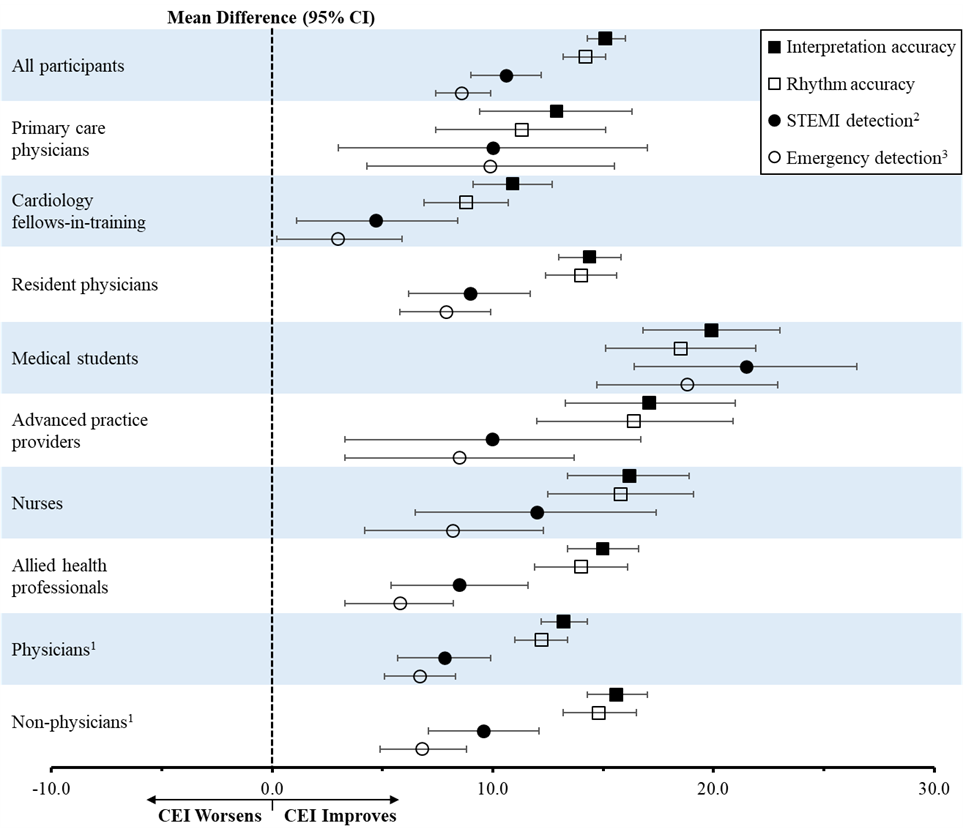Introduction: The interpretation of electrocardiograms (ECGs) involves a dynamic interplay between computerized ECG interpretation (CEI) software and human overread. However, the impact of computer ECG interpretation on the performance of healthcare professionals remains largely unexplored. The aim of this study was to evaluate the interpretation proficiency of various medical professional groups, with and without access to the CEI report.
Methods: Healthcare professionals from diverse disciplines, training levels, and countries sequentially interpreted 60 standard 12-lead ECGs, demonstrating both urgent and nonurgent findings. The interpretation process consisted of 2 phases. In the first phase, participants interpreted 30 ECGs with clinical statements. In the second phase, the same 30 ECGs and clinical statements were randomized and accompanied by a CEI report. Diagnostic performance was evaluated based on interpretation accuracy, time per ECG (in seconds [s]), and self-reported confidence (rated 0 [not confident], 1 [somewhat confident], or 2 [confident]).
Results: A total of 892 participants from various medical professional groups participated in the study. This cohort included 44 (4.9%) primary care physicians, 123 (13.8%) cardiology fellows-in-training, 259 (29.0%) resident physicians, 137 (15.4%) medical students, 56 (6.3%) advanced practice providers, 82 (9.2%) nurses, and 191 (21.4%) allied health professionals. The inclusion of the CEI was associated with a significant improvement in interpretation accuracy by 15.1% (95% confidence interval, 14.3-16.0; P < 0.001), decrease in interpretation time by 52 s (-56 to -48; P < 0.001), and increase in confidence by 0.06 (0.03-0.09; P = 0.003). Improvement in interpretation accuracy was seen across all professional subgroups, including primary care physicians by 12.9% (9.4-16.3; P = 0.003), cardiology fellows-in-training by 10.9% (9.1-12.7; P < 0.001), resident physicians by 14.4% (13.0-15.8; P < 0.001), medical students by 19.9% (16.8-23.0; P < 0.001), advanced practice providers by 17.1% (13.3-21.0; P < 0.001), nurses by 16.2% (13.4-18.9; P < 0.001), allied health professionals by 15% (13.4-16.6; P < 0.001), physicians by 13.2% (12.2-14.3; P < 0.001), and nonphysicians by 15.6% (14.3-17.0; P < 0.001).
Conclusions: CEI integration improves ECG interpretation accuracy, efficiency, and confidence among healthcare professionals.
Reference: Kashou AH, Noseworthy PA, Beckman TJ, Anavekar NS, Cullen MW, Angstman KB, Sandefur BJ, Shapiro BP, Wiley BW, Kates AM, Huneycutt D, Braisted A, Manoukian SV, Kerwin S, Young B, Rowlandson I, Beard JW, Baranchuk A, O'Brien K, Knohl SJ, May AM. Impact of Computer-Interpreted ECGs on the Accuracy of Healthcare Professionals. Curr Probl Cardiol. 2023 Nov;48(11):101989. doi: 10.1016/j.cpcardiol.2023.101989. Epub 2023 Jul 22. PMID: 37482286.



 عربى
عربى  中国人
中国人  Dansk
Dansk  English
English  Suomalainen
Suomalainen  Français
Français  Deutsch
Deutsch  Ελληνικά
Ελληνικά  Bahasa Indonesia
Bahasa Indonesia  Italiano
Italiano  日本
日本  Melayu
Melayu  Norsk
Norsk  Português
Português  Русский
Русский  Español Europeo
Español Europeo  Español
Español  Svenska
Svenska